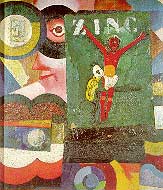
|
|
|
| History of Portuguese Literature | Origins of Portuguese Literature | The Portuguese Language | Oral Literature | Fiction | Lyricism |
| Travel Literature | Cantigas de amigo | Historiography | Doctrinal Prose | ||
Mário de Sá-Carneiro
(1890-1916)
|
|
He was one of the greatest
poets of Portuguese Modernism, perhaps the one who
best expresses the split between the subject in the enunciation of itself and in
the formulation of its perception of the world, sometimes deceptive in his use
of the symbolist and decadentist style, sometimes inebriated by the sensations
and enthusiasms of futurism.
 "Cristo Vermelho" (Red Christ), by Amadeo de Souza-Cardoso [1887-1918] |
His
poetics was far removed from a merely formal concern with literary experiment.
His discourse was centred upon this, although it also served as a basis for the
questions and the affirmation of longings that give meaning to an existence that
does not, however, find the answer to these questions. The poet put an end to
his life, committing suicide in Paris.
I
lost myself within myself
Because I was a labyrinth,
And today, when I feel myself,
I find that I long for myself.
I
have passed through my life
Like a crazy star dreaming.
In the anxiety of going beyond,
I didn’t even notice my life... (...)
Twilight
has descended upon my soul;
I was someone passing by.
I shall be, but I am no longer myself;
I do not live, I sleep the twilight.
«Dispersão»
© Instituto Camões, 2001